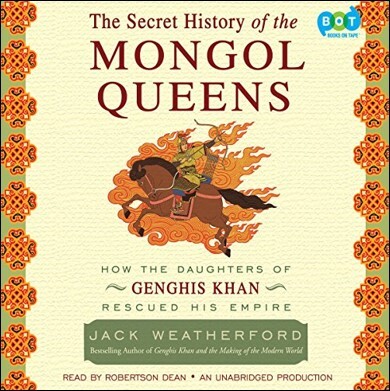
In one of those "blow your mind" discoveries of unsung women in history comes the story of the daughters of Genghis Khan. I've never heard that he had daughters, let alone daughters who "ruled the largest empire the world has ever known."
Jack Weatherford, the former DeWitt Wallace Professor of anthropology at Macalester College in Minnesota, is best known for his 2004 book, Genghis Khan and the Making of the Modern World. After its publication, he researched and wrote The Secret History of the Mongol Queens: How the Daughters of Genghis Khan Rescued His Empire.
He says "Genghis Khan sired four self-indulgent sons who proved good at drinking, mediocre at fighting, and poor at everything else; yet their names live on despite the damage they did to their father's empire. Although Genghis Khan recognized the superior leadership abilities of his daughters and left them strategically important parts of his empire, today we cannot even be certain how many daughters he had…[but] without Genghis Khan's daughters, there would have been no Mongol empire."
"Four became ruling Queens of their own countries and commanded large regiments of soldiers. At least one became literate, but several supported scholars, schools, and the publication of religious and educational texts. Some had children, while others died without surviving descendants… The royal Mongol women raced horses, commanded in war, presided as judges over criminal cases, ruled vast territories, and sometimes wrestled men in public sporting competitions. They arrogantly rejected the customs of civilized women of neighboring cultures, such as wearing the veil, binding their feet, or hiding in seclusion. Some accepted the husband's given to them, but others chose their own husbands or refused any at all. They lived by the rules of society when prudent, and they made new rules when necessary.
"Never before or since have women exercised so much power over so many people and ruled so much territory for as long as these women did.
"Yet almost as soon as Genghis Khan died, the daughters came under attack, first from the wives of their brothers [which] soon degenerated into simply a war against women in power. In the next generation, their nephews, the grandsons of Genghis Khan, intensified the attack on the systematic balance of powers left by Genghis Khan and the lineages of his daughters. The youngest whom "Genghis Khan loved more than any of his other daughters," was treacherously assassinated by her brother soon after their father's death.
"Through most of the Mongol imperial era, from 1206 until 1368, the royal women of Genghis Khans clan mounted a persistent opposition to the centralized governments of their male relatives. Not only did the women fight outside efforts to claim their territories but even after some faced gruesome and horrendous deaths, their daughters and granddaughters continued the struggle for the heritage bestowed upon them by Genghis Khan.
"With the official role of royal women compromised and then nearly eliminated, the empire buckled, collapsed, and died. By 1368 the Mongols had lost their lands, fled back to their steppe homeland in disgrace, and resumed fighting among themselves with even more viciousness than ever. The bickering, feuding, and raiding lasted for another century, until a new queen unexpectedly appeared around 1470. Queen Manduhai The Wise awakened the forgotten consciousness of the Mongols, put the Mongol nation back in order, created a new government, and then, like the Mongol Queens before her, disappeared back into the fog of neglect."
"Through the generations, Mongol chroniclers and scholars dropped the names of Genghis Khan's daughters one by one from their accounts."
In fact, Weatherford begins his book with a graphic depiction of this erasure: "On an unknown day late in the 13th century, an unidentified hand clumsily cut away part of the text from [the official, extant document], The Secret History of the Mongols. The censored portion recorded words spoken by Genghis Khan in the summer of 1206 at the moment he created the Mongol empire and gave shape to the government that would dominate the world for the next 150 years. The sensor left a single short sentence of the mutilated text that hinted at what had been removed: "let us reward our female offspring."
Warning: Chapter 5: "The War Against Women" opens with extremely triggering/distressing details.